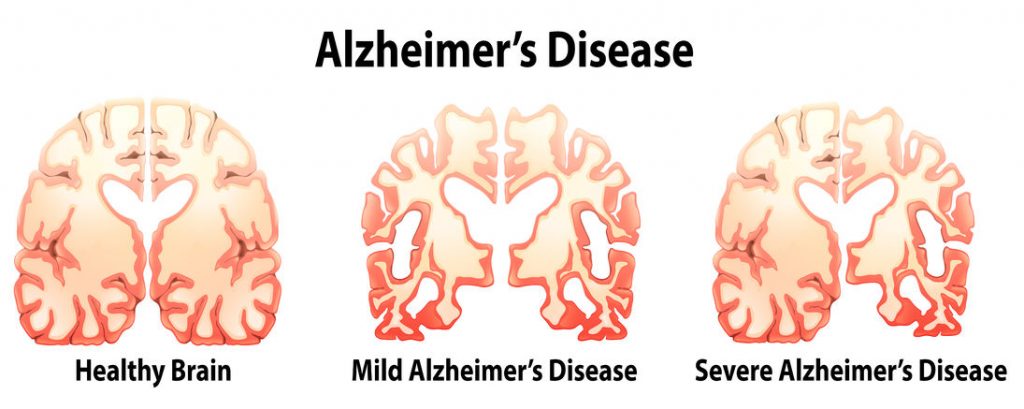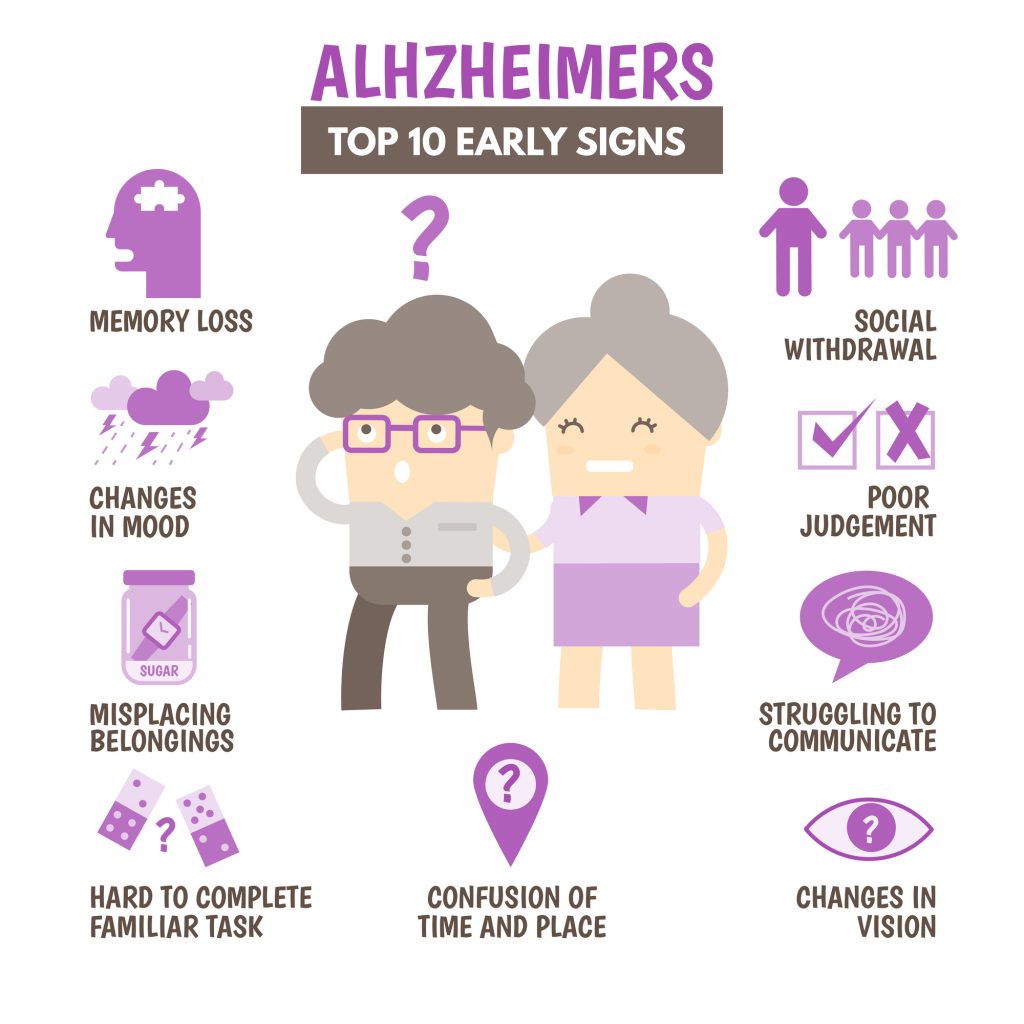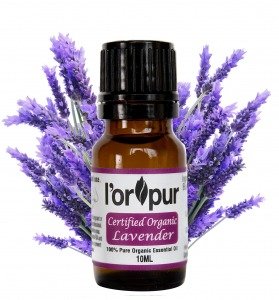
Hi readers, I’m glad you made the time to be here with us and trust me, it’s time very well spent. We’ll be talking about one of the most sensitive yet common medical conditions that causes more pain to those around you. Essentially, we’re all made up of memories, thoughts, and our experiences; these are the building blocks that make up our different personalities.
Without your memories, have you ever wondered what type of person you would be? No matter the answer, one thing’s for sure; anything that interferes with your memory and reasoning will disrupt your day to day life significantly.
In today’s segment, we’ll be looking at a broad category of brain diseases known as Dementia and some of the most common types of the condition. We’ll also look at how the disease presents itself and how the loss of memory and cognitive function affects people with different kinds of dementia.
But hey, it’s not all doom and gloom people! As always, Olivia’s got you covered with a few tips that will help you prevent the onset of dementia as well as all the treatment options available. And if your dementia has progressed too far, there are plenty of ways to manage and live with the condition. And it’s all right here on Olivia’s mother of all guides to everything you need to know about dementia, Alzheimer’s, and other brain diseases.
What Is Dementia?

As stated above, dementia is a broad and extensive category of different brain diseases that all cause gradual and long-term decrease in your ability to think and recall information. Sure, we all forget sometimes, but the decline in mental ability has to be significant enough to affect your day to day functioning for it to be dementia.
Now, while various types of dementia carry symptoms such as problems with language and impaired judgment, the person’s consciousness is not usually affected. But as most of you already know, these diseases really have a significant effect on the patient’s loved ones and caregivers. Before I give you a comprehensive list of the symptoms of dementia, let’s have a look at some of the common types of dementia which are also the causes strangely enough.
Types And Causes Of Dementia
As explained above, dementia is a broad category or syndrome of brain diseases, each with its own collective causes. These diseases include:
1. Alzheimer’s Disease
This is the most common type of dementia that makes up 50 to 70% of all known cases. Essentially, Alzheimer’s is a chronic neurodegenerative disease that typically starts off slow and becomes more severe as time goes. The early symptoms of AD include difficulties recalling recent events or short-term memory loss. But as the disease progresses, you can expect problems with language, mood swings, disorientation, loss of motivation, behavioral issues, getting lost, among others.
Little by little, other body functions decline until the body can no longer support life. While the speed of progression varies from person to person, the average life expectancy after being diagnosed is four to ten years. Now, the cause of Alzheimer’s may be poorly understood, but 75% of the risk factors are believed to be genetic. Other causes include depression, head injuries and hypertension.
2. Vascular Dementia
As the second most common type of dementia, vascular dementia makes up about 20% of all known cases. This type of dementia is usually caused by an injury or disease that affects the blood supply to your brain (usually a series of minor strokes). Symptoms of VD depend on where the strokes occur. However, multiple injuries will cause progressive dementia whereas a single injury in the cognitive sector can cause sudden decline.
3. Frontotemporal Dementia
Characterized by severe personality changes and difficulties in finding the right words, FTD actually stands out in that memory problems aren’t the main issue. People with this type of dementia show early social withdrawal as well as a lack of insight into their condition.
4. Dementia with Lewy Bodies
This is a form of dementia with primary symptoms that include Parkinsonism and visual hallucinations. Parkinsonism simply refers to rigid muscles, tremors, and shakes as well as a face without emotion. The visual hallucinations usually occur when the person is falling asleep or waking up and they can get really vivid. Other symptoms include problem-solving issues, no attention span, difficulties getting organized and loss of visual-spatial function.
5. Other Causes of Dementia
Aside from all the above diseases that I have mentioned and others that I haven’t such as Mixed Dementia, there are plenty of other causes of the condition. These include vitamin B12 deficiencies, hypothyroidism, lyme disease, neurosyphilis, among others. Anyone with memory loss or cognitive difficulties should be tested and checked for vitamin deficiencies and hypothyroidism.
Symptoms Of Dementia / Alzheimer’s
Like most other conditions, the symptoms of dementia tend to vary across the different types as well as stages of the condition. It’s even possible for one person to have two or three different types of dementia (a condition referred to as mixed dementia). Now, you already know that most types of dementia are very slow but incredibly progressive. So by the time the individual starts displaying signs and symptoms, chances are that the process has been going on for quite a while. Generally, here are the main signs and symptoms experienced by most Dementia and Alzheimer’s patients.
- Memory distortions and disorientation
- Speech and language difficulties
- Restlessness, agitation, and wandering
- Trouble communicating
- Visual and perception difficulties
- Getting lost in areas that you were familiar with
- Tremor and balance problems
- Problems eating and swallowing
- Depression and irritability
- Abnormal motor functions and behaviors
- Elated moods
- Apathy, disinhibition, and impulsivity
- Hallucinations, delusions, and psychosis
Prevention And Management Of Dementia / Alzheimer’s Disease
Part 1: Preventing Dementia
While there is no definitive evidence that the following measures are effective in preventing dementia such as Alzheimer’s, there are some risk factors that have been identified. Through a group of efforts, it is believed that a third of the cases of dementia can be prevented using early education, preventing obesity, treating blood pressure, depression and diabetes as well as not smoking. I’ve compiled some of the most effective groups of efforts that should help prevent the common types of dementia.
a) Lifestyle Changes
Studies have shown that people who repetitively engage in intellectual activities such playing board games, reading, playing musical instruments, completing crossword puzzles and regular social interaction displayed a reduced risk for Alzheimer’s and several types of dementia. Similarly, physical exercise also plays an important role in reducing the risk of cognitive failure. So get some exercise, learn a second language, keep your brain sharp and you might just lessen the rate of dementia or avoid it altogether.
b) Diet
Did you know that people who follow a Mediterranean, Japanese or just well-rounded, healthy diet actually have a lower risk of getting dementia? Similarly, those who eat a highly saturated fat and simple carb diet are at a higher risk of getting Alzheimer’s. There’s also some evidence (to be confirmed) that dietary components such as coffee, tea, red wine, and cocoa may decrease risk of getting certain types of dementia.
Part 2: Managing Dementia / Alzheimer’s
With the exception of a few instances where causes are reversible, there is no cure for most progressive types of dementia such as Alzheimer’s. There’s also no known treatment that slows or stops the progression of these brain diseases. Fortunately, there are available treatments that only focus on offering temporary relief from the symptoms, but they’re all palliative in nature with very dismal benefits. I’ve compiled some of the most effective ways of managing dementia.
a) Medication
As explained above, no medications have been shown to cure or prevent the onset of dementia. However, some drugs and medications can be used to treat the cognitive and behavioral symptoms without any effect on the underlying process. These include Acetylcholinesterase inhibitors like donepezil which is useful of Alzheimer’s, vascular dementia, DLB and other forms of the condition. Other drugs include receptor antagonists and memantine, but their benefits are very small. Some doctors recommend atypical antipsychotics for aggressive patients, but these come with adverse side effects such as faster cognitive decline, movement difficulties or even strokes.
b) Caregiving
Seeing that most cases of dementia are progressive and gradually render people incapable of tending to their own needs, caregiving is automatically the best and most effective treatment and management for dementia. During the early stages, this will include modifying the living environment and lifestyle to increase safety, creating simple routines, placing locks, labeling items, setting alarms and reminders, and anything else to make life easier for your loved one.
But as the disease progresses, specialized and professional care may be required. Adult care homes are the perfect facilities for specialized care because in addition to providing round the clock supervision, recreation and respite for people with dementia, they also offer health care as well as anything else the person may need to feel comfortable.
c) Palliative Care
I was really battling with whether to include this part or not. But being a very significant aspect of the final stages of dementia, I feel it’s important to at least touch on it. Given the terminal and progressive nature of some types of dementia, palliative care is essential for helping both the patient and caregiver in knowing what to expect. The decline in brain function can be swift. As such palliative care is highly recommended, especially in the final stages of dementia. This will help you plan out your goals and wishes with respect to whether or not to get life support or be resuscitated when your critical bodily functions come to a halt. I’ll be the first to admit; it’s never easy trusting someone with your life. But believe me when I say, it’s harder to trust someone when you don’t remember who they are. So please, try to have this talk as early as possible.
Essential Oils For Dementia / Alzheimer’s

Did you know that by the time you’re done reading this sentence, about 3 people will have already been diagnosed with one type of dementia or the other? This means a global population of 50 million people and an additional 10 million new cases every year. And it gets worse because the WHO expects the number of dementia cases to double by 2025.
With such astronomical numbers, it’s easy to see why giant drug companies love Dementia and Alzheimer’s disease. But the sad part is that not only do these pharmaceuticals and receptor antagonists come with very dismal benefits, but their side effects alone would make you shudder. I mean, on which planet does it make sense for medicine that’s supposed to manage memory loss carry extremely adverse side effect such as faster cognitive decline, movement difficulties, and strokes!
NO MORE! It’s time to end the madness people. We all know most cases of dementia are progressive. So what do you think will happen when you straddle your loved ones with an entire box of drugs and an ever-expanding list of prescriptions?
You can’t even imagine how brutal and life-sucking some of these side effects can be. It might sound harsh, but I’d rather forget my entire family and live a relatively healthy life than endure side effect such as multiple strokes trying to remember them.
Problem is, over 80% of dementia patients tend to exhibit non-cognitive symptoms such as aggression, psychosis, agitation, wandering and sleep disturbance. So many doctors will often prefer to drug their patients instead of finding natural treatment and management options.
But I’m glad that you and all my readers have chosen a kinder, safer and more natural way to manage the symptoms of dementia. Essential oils have been used for generations to ease anxiety, depression, insomnia and other psychological symptoms. Today, alternative medicine has perfected the use of essential oils which are now helping people overcome anxiety, improve their moods, boost memory, learning, focus, and cognitive functions as well as treat most of the symptoms that come with various forms of dementia.
The list of these magical oils is endless, so I’ll just touch on a few of the most effective and recommended oils for Dementia / Alzheimer’s.
5 Top Essential Oils For Dementia / Alzheimer’s
1. Lavender Essential Oil
Introducing one of the most diverse, versatile and popular aromatic oils, Lavender is a must have for anyone dealing with any type of dementia. Being among the gentlest of all oils, lavender EO can sometimes be used topically without any need for dilution. Packed with a throng of sedative, calming, relaxing and aromatherapeutic properties, lavender essential oil is ideal for relieving anger, irritability, depression, anxiety, insomnia and help balance strong emotions.
2. Ylang Ylang Essential Oil
When it comes to calming the body and putting the mind entirely at ease, nothing beats good old Ylang Ylang essential oil. Now, while this oil packs all the stress-busting and anxiety killing properties of peppermint and rosemary, it carries none of the stimulating capabilities. This makes it ideal for using at night since it won’t cause insomnia. However, Ylang Ylang essential oil won’t do much for your focus or concentration.
3. Lemon Essential Oil
Here’s another common yet incredibly effective essential oil. Having been put to the test scientifically time and time again, the benefits of lemon essential oil are widely recognized. It has been globally used before to relax and calm people dealing with sleep disturbances, anxiety, irritability, and depression. What’s more, lemon EO also helps ease indigestion, improve cognitive capabilities, and relieve other symptoms of progressive dementia.
4. Rosemary Essential Oil
Quite similar to peppermint, rosemary EO is hands down the sweetest smelling oil (and the most expensive). But aside from its price tag, Rosemary essential oil also boasts of an array of uplifting properties. It is incredibly useful as a stimulant that charges up the mind and body. Likewise, rosemary essential oil has also been shown to enhance your mood and improve certain parts of your brain functionality.
5. Peppermint
Here’s one of the best smelling essential oils and admittedly, my personal favorite too. In addition to carrying a pleasant and relaxing aroma, peppermint is an energizer that can be used to stimulate the mind and boost memory function.
Spearmint also works almost as good as peppermint, but its properties are slightly milder. But while peppermint EO does have some calming properties, it’s better to use it in the morning or daytime since it could keep you awake if used at night. On a side note, my great grandma used peppermint leaves in quite the peculiar way. She would dry them out, grind them up, sprinkle the powder in her marijuana cigarette and smoke away. Happiest case of Alzheimer’s I ever saw.
6 Best Essential Oil Recipes For Alzheimer’s Disease / Dementia

Recipe 1: Relaxing Roll On
Ingredients:
- 8 drops Lavender EO
- 10 drops Peppermint EO
- 6 drops Lemon EO
- Fractionated coconut oil
- 10 ml roller bottle
Method:
Remove the roller ball form the bottle and add in your essential oils one at a time. Shake it up a bit and top up the bottle with fractionated coconut oil. Snapback the roller ball and shake it up one more time to get the ingredients thoroughly mixed up. Roll the mixture on your temples, behind the ears, base of the skull, wrists and other pulse points for maximum benefits. This particular blend should provide well-rounded benefits ranging from relaxing, calming effects all the way to stimulating.
Recipe 2: Mental Support Inhalation Blend
Ingredients:
- 8 drops of Cedarwood EO
- 5 drops of Lavender EO
- 3 drops Frankincense EO
- 2 drops Peppermint EO
- Aromatherapy inhaler
Method:
Pop out the cotton wick from your inhaler and add in the essential oils. You’ll want to adjust the number of drops depending on the size of your inhaler. Place the cotton wick back and close the cap. Breathe in your blend deeply as often as needed to help calm the senses, oxygenate the brain and promote a sense of peace. The different scents that the oils carry will also help alleviate any feelings of irritability, anxiety and depression.
Recipe 3: Foot Blend
Ingredients:
- 12 drops Frankincense EO
- 8 drops Rosemary EO
- 6 drops Lemon EO
- 4 drops Ylang Ylang EO
- 60ml (2 ounces) Fractionated coconut oil
Method:
This foot rub is designed to provide all-day and all-night benefits to the user. Mix the above essential oils in a nonreactive bowl and add in the fractionated coconut oil or your preferred carrier oil. Apply the blend to your feet and be sure to wear some socks to prevent the oils from staining your bed sheets at night. This should help you stay relaxed and combat any instances of sleep disturbances.
Recipe 4: Dementia Diffuser Blend

Ingredients:
- 3 drops Lavender essential oil
- 4 drops Spearmint EO
- 6 drops Chamomile EO
- 2 drops Vetiver EO
Method:
Add all the above essential oils into your diffuser and use as normal. If you’re suffering from insomnia or other psychological symptoms, this blend is precisely what the doctor ordered. Diffuse through the entire night for a great night’s sleep.
Recipe 5: Refreshing Memory Mist
Ingredients:
- 6 drops Bergamot EO
- 4 drops Ginger EO
- 4 drops Basil EO
- 3 drops Rosemary EO
- Distilled water
- Spray or misting bottle
Method:
Here’s one of the most effective ways to impart the aroma of essential oils into the air. Simply add all the above essential oils into the misting bottle and fill it up with water. Shake the bottle vigorously to blend the oils and water and then mist the air as desired.
Recipe 6: Quick Alzheimer’s Lotion
Ingredients
- 2 drops Ylang Ylang EO
- 2 drops Lavender EO
- 1 drops Rose EO
- 2 tablespoons unscented lotion
Method – This quick lotion will let you make the most of your oils topically. Simply add your essential oils to your normal, unscented lotion, mix them up and apply to your pulse points.
The Bottom Line
That wraps up today’s segment on everything you need to know about Dementia and its various types such as Alzheimer’s disease. With this information, you’ll be able to know what to expect as well as which treatment routes to take. But no matter what you do, it’s best to remember that most forms of dementia are progressive and have no known cure yet. So don’t beat yourself up looking for a miracle cure.
While medicines and other remedies will help, it’s also vital to ensure that your loved ones are comfortable and have adequate care and assistance in their time of need. And even if they forget who you are or display aggression towards you, don’t take it personally; it’s all part of the process. So take it lightly, play along and try to put your loved one’s mind at ease no matter what. And lastly, you’re never alone in this journey, Olivia will always be right here to lend a listening ear and a helping hand.






